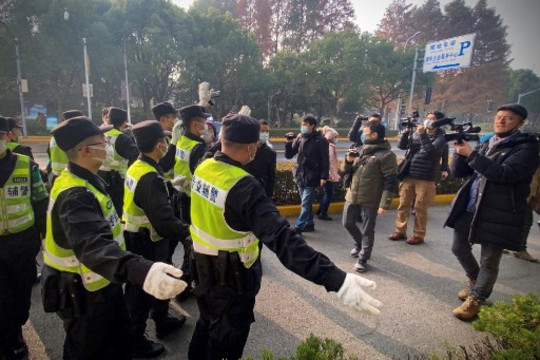The FCCC issued its annual report on March 1 based on a survey that attracted responses from 150 of its 220 members. For the third year in a row, no journalist said working conditions had improved in China.
“The FCCC is very disappointed that media freedoms deteriorated significantly in 2020, and strongly condemns the use of journalists in diplomatic conflicts,” the FCCC said.
At least 18 foreign correspondents from U.S.-headquartered news organisations, including The New York Times, Wall Street Journal, and Washington Post, were expelled in 2020, after Chinese authorities cancelled their press credentials. It is widely seen as a retaliatory move by Beijing after Washington capped the number of Chinese journalists deployed in America, leading to the departures of dozens of employees of Chinese state media.
Since September, foreign correspondents working with the American press have been denied press credentials, regardless of their nationality. The Chinese authorities instead issued “letters” that would allow them to work in China for less than one year.
At least 13 journalists received press credentials valid for six months or less, the survey found. Nathan VanderKlippe of Canada’s Globe and Mail said he received seven consecutive one-month visas before being handed a three-month visa.
The report said: “All arms of state power – including surveillance systems introduced to curb coronavirus – were used to harass and intimidate journalists, their Chinese colleagues, and those whom the foreign press sought to interview.”
China has ramped up its efforts to frustrate and obstruct foreign correspondents who tried to cover Covid-19, often citing public health concerns as excuses. Journalists were faced with similar harassment, interrogations, and even cyberattacks for various reasons, such as trying to report on Xinjiang and Hong Kong. Their Chinese colleagues were also endangered. Notably, journalist Haze Fan, who had worked with the Bloomberg China bureau since 2017, was detained in December on suspicion of jeopardising national security.
The IFJ said: “Chinese officials have repeatedly claimed to be open and transparent during the Covid-19 pandemic, but journalists’ accounts have proven otherwise. The Chinese authorities have paid no regard to media freedom while continuously undermining journalists’ rights and safety. The IFJ joins forces with the FCCC to urge China to stop targeting foreign journalists and their Chinese colleagues, and calls for the international community’s awareness of the deteriorating media freedom in China.”

